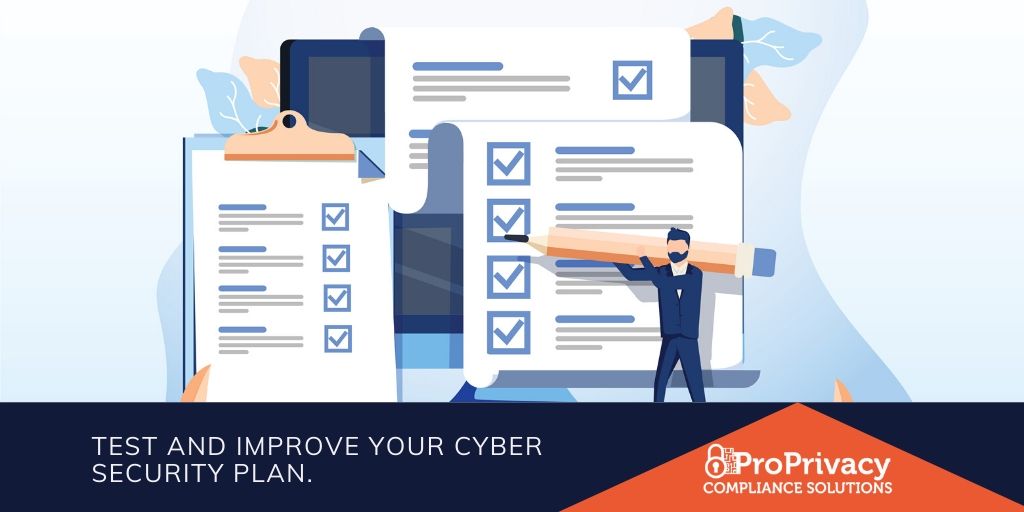It’s not enough to just have a cyber security plan
Decision-making and deployment
Once your cyber security incident response plan has been deployed, it’s all too easy to fall into complacency. But an effective incident response plan is an ongoing effort, evolving as your business changes and grows.
Does your cyber security plan work in the real world?
Of course, the best laid plans may not prosper, but you won’t really know that until you’ve tested them. Playing out real-world scenarios and ensuring your cyber security incident response plan has the mettle for it, must be done. Don’t let overconfidence lull your team into complacency. Get testing!
Vulnerability testing
Ensuring your internal network, and externally-facing company assets, are secure is a priority. But, to truly understand just how easy – or hopefully difficult! – it can be to gain access to these, you’ll need to conduct vulnerability testing. Vulnerability assessments function as problem-spotting programmes, identifying potential threats to your business, the risks they pose, and spotting any loopholes in your networks. Use the results of your vulnerability assessment to update and enhance your cyber security incident response plan.
Real-world scenario testing
Simulating a cyber attack so that you can be sure of your company’s ability to respond, is a must. Consider these as important as fire drills and office evacuation exercises. We recommend three levels of testing for your company’s internal teams:
- Executive level testing: At this level, your executive team, management, and public relations teams must know what to do and how to respond to every possible scenario. A cyber security incident is not just a technical problem; it can become a communications crisis too.
- Response team testing: Your IT department and its service providers will be first to the front when a cyber attack compromises the integrity of your business’ digital assets. How quickly do they respond, and who is responsible for ensuring every policy and procedure is followed?
- End-user testing: You may think that your data capturing team, call centre agents, and secretaries, have a minor role to play in a cyber security incident response plan. You’d be wrong. The people who work at the front line of your business are an important part of your response mechanisms and play an even greater role in managing queries, helping customers understand the effects of a cyber attack, and communicating how your company is responding to one. Skipping this level of testing would be very foolish indeed.
Debrief and decide
Here’s the big thing: cyber security incidents happen. Accidents happen. Slip-ups happen. Being prepared for them, taking ownership of them, and then resolving any problems that may have occurred as a result of a cyber security incident, must be the priority. Debriefing your team after testing your cyber security incident response plan, will give you great insight into how to rolls out on the floor of your business. Insights from your teams at the coalface can help you improve your response at every level of your business. Debrief, make decisions, and then improve your cyber security incident response plan, as you need to.
At ProPrivacy, we help companies like yours gear up for the battle of ensuring they stay secure. Get in touch and we’ll help you test your cyber security incident response plan.
Philipa is the lead consultant and auditor at ProPrivacy. With clients as far afield as Canada, South Africa, Kenya, Germany, Spain and other such exotic locations, besides Cork and elsewhere in Ireland, Philipa enjoys a broad view of the state of data protection, privacy and cyber security worldwide. Philipa’s passion is manageable data compliance for SMEs.
Philipa is a qualified teacher besides holding a computer science (Bachelor of Science in Artificial Intelligence Programming) and electronic and intellectual property law (LLB) qualified. She is trained in constitutional (fundamental) rights litigation and enjoys a good debate.
Philipa has over twenty years of experience working in different sized organisations and sectors on operational, governance, risk management and compliance matters. She is an analytical and focused person that enjoys a challenge in the workplace. She loves technology, systems and people and has a passion for showing people how technology can make life easier and better. She understands that the world is driven by data today but privacy is paramount. Responsibly developed AI excites Philipa for the future.

